Summary of Findings
A growing number of Americans oppose military action in Iraq, amid widespread concern over the potential negative consequences of war. For the first time since the Iraq debate intensified this summer, a majority of Democrats oppose the use of force to remove Saddam Hussein from power. And while a 55% majority still favors military action, this is fewer than the more than six-in-ten who have consistently supported that option since late August. A third (34%) now oppose military action, up from 28% earlier this month and 21% in late August.
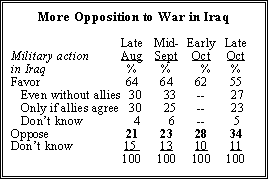
The public’s leading concern arising from a possible conflict is that Iraq will deploy chemical or biological weapons against U.S. forces; six-in-ten (59%) say they worry a great deal about this. A 52% majority expresses concern about the general prospect of heavy military casualties. And compared with the first Persian Gulf War, many more Americans fear a conflict with Iraq will raise the risk of terrorism in the United States. Half (51%) express that concern now, compared with just a third in late January 1991, after the Gulf War began.
As in previous surveys, support for using force against Iraq declines markedly in the absence of allied backing for such an operation. Fewer than three-in-ten (27%) say they would favor military action against Baghdad if the allies do not go along, down from 33% in mid-September.
The latest nationwide Pew Research Center survey of 1,751 adults (1,305 registered voters), conducted October 17-27, shows that massive public interest in the sniper attacks in the Washington D.C. area has overshadowed the debate over war in Iraq. Nearly two-thirds of the public (65%) followed news about the sniper case very closely, making it the top news story of the year. While a majority (53%) tracked the Iraq debate very closely, that is down from 60% in early October.
The survey finds that, with midterm elections less than a week away, the prospect of war with Iraq and other major national issues are not affecting voters’ views of the two parties. Republicans continue to be seen as better able to handle Iraq and terrorism, while Democrats hold the advantage on Social Security. Perhaps most important, neither party has a significant edge on the economy, the issue that voters most want to hear discussed in their state and local races (see “Americans Thinking About Iraq, But Focused on the Economy,” Oct. 10).
Half of Democrats Now Oppose War
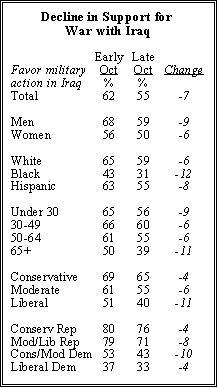
The decline in public support for using force against Iraq is evident among all demographic and political groups, but the decrease has been particularly noteworthy among African-Americans. Just three-in-ten (31%) support military action today, down 12 percentage points since early October. Support also has slipped among liberals, people age 65 and older, residents of the Northeast and those with less than a high school diploma (down at least 11 points each).
The falloff in support for military action has been comparable among Democrats and Republicans (nine points and seven points, respectively). But a majority of Democrats (51%) now oppose using force to oust Saddam, while 40% favor military action. In early October, Democrats supported military action, 49%-43%.
While majorities of every other age group back military action, those age 65 and older, on balance, are opposed. Nearly half (47%) oppose military action, while just 39% are supportive. And there continues to be a gender gap over taking action against Iraq with men more supportive than women of using force against Saddam (59%-50%).
Bush Making the Case?
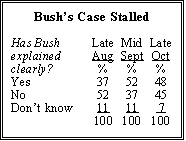
In September, President Bush made significant progress in explaining his case for military action in Iraq to the American public, but the new poll indicates that, if anything, he has lost ground in this effort since then. The public is split over whether Bush has clearly explained the U.S. stakes in Iraq 48% say he has, while 45% disagree.
Last month, following Bush’s well-received speeches at the United Nations and for the commemoration of the 9/11 anniversary, a 52% majority thought Bush had presented a clear rationale for using force, while just 37% said he had not. The perception that Bush is not making a clear case for war has increased among all demographic groups.
Leading Worries: Chemical Attacks, Casualties
Americans express a number of concerns over the possible consequences of military action, including the use of chemical or biological weapons against U.S. troops, high casualties among U.S. troops or Iraqi civilians, increased terrorism against the U.S., the difficulty of stabilizing Iraq after a war, and the specter of all-out war in the Middle East. Only 17% of the public is not worried a “great deal” about at least one of these potential problems, and over a quarter (27%) are worried about five or all six.
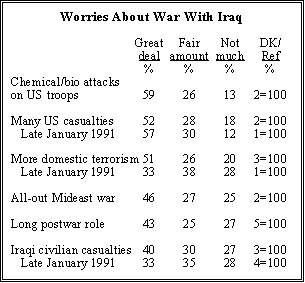
Americans today are much more worried about the possibility that war with Iraq might lead to increased terrorism in the U.S. than was the case in 1991 when this question was first asked (51% now worry a great deal, compared with 33% in January 1991 after the war began). There is also somewhat greater concern about the prospect of a large number of Iraqi civilian casualties (40% now worry a great deal, compared with 33% in 1991). By contrast, concern about American casualties while high is nonetheless lower than in 1991. Currently, 52% worry a great deal that U.S. forces might sustain a lot of casualties in a war with Iraq; in 1991, 57% worried a great deal about this.
Concern about the spread of war throughout the region is also on the minds of many Americans, with 46% of respondents saying they worry a great deal about all-out war in the Middle East. And another 43% worry a great deal that it will take a long time to stabilize Iraq after the war is over. The Pew Research Center’s early October poll found 60% of the public supportive of a major U.S. effort to rebuild Iraq if there is a war and establish a stable government there.
Opponents Have Many Concerns
When it comes to the threat of chemical or biological attacks against U.S. forces, supporters of military action are nearly as likely to be very worried (59%) as war opponents (62%). But on other issues there is a larger gap. Just under half (46%) of those in favor of war in Iraq worry a great deal about heavy U.S. casualties and an increased risk of terrorism. Six-in-ten war opponents worry a great deal about these problems. And supporters are significantly less concerned about the conflict spreading throughout the Middle East (38%), the difficulty of stabilizing Iraq (34%) or the prospect of large numbers of Iraqi civilian casualties (30%).
Stable Party Images
Despite heavy campaigning in many parts of the country, voters’ perceptions of the political parties have changed little over the past few months. More voters express confidence in the Republicans’ ability to deal with the threat of terrorism here in the U.S. (by a 44% to 27% margin), while Democrats have a significant advantage when it comes to making the Social Security system financially sound (42% vs. 31% who think the GOP would do better).
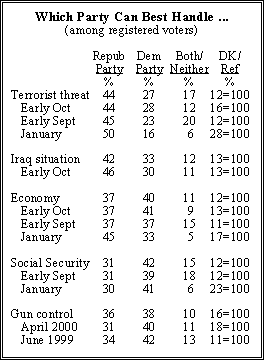
And neither party has a clear advantage in being seen as better able to handle the economy four-in-ten give the Democrats the edge on this issue, 37% the Republicans. This is virtually unchanged from surveys conducted earlier this month and in early September. In January, the GOP had a significant lead on this issue (45%-33%).
Republicans are still seen as better able to make wise decisions about what to do in Iraq, though by a slightly narrower margin than earlier this month. Republicans have a nine-point edge on this issue today, with 42% of voter s favoring the Republicans on Iraq, and a third placing more confidence in the Democrats to better handle this issue. The GOP had a 46%-30% edge in early October.
Voters are split over which party best reflects their views on gun control (38% Democrats, 36% Republicans). The Democrats’ modest advantage, evident before and during the 2000 presidential campaign, has disappeared. As in the past, there is a gender gap on gun control; men favor Republicans (45%-35%), while women favor Democrats (41%-28%).
President Bush’s job performance rating stands at 59%, which is largely unchanged since early October (61%). Over the last two months, Bush’s ratings have hovered in the 60% range, with the exception of his 67% score in mid-September following his speeches at 9/11 anniversary ceremonies and the United Nations. The president’s ratings are currently about 10 points higher than in the summer of 2001, prior to the 9/11 attacks, when they stood at about 50%.
Sniper Attacks Lead News Index
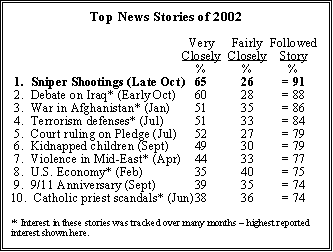
Nearly two-thirds of Americans (65%) say they paid very close attention to news of the sniper attacks in the Washington, D.C. area, making it the year’s top news story. This interest is not limited to the region where the shootings occurred. Fully nine-in-ten in every part of the country say they followed this story at least fairly closely.
The only story this year to approach that level of interest has been the continuing debate about possible military action against Iraq. Six-in-ten Americans followed that story very closely in early October, but interest subsided a bit to 53% in the current survey.
Voter interest in the midterm elections continues to be on par with previous campaigns. More than six-in-ten (62%) are following campaign news at least fairly closely, with 28% saying they follow news about candidates and the election very closely.
A quarter of the public closely followed North Korea’s admission that it has been secretly developing nuclear weapons, while 20% paid very close attention to the suspected terrorist bombing of a nightclub in Bali, Indonesia.